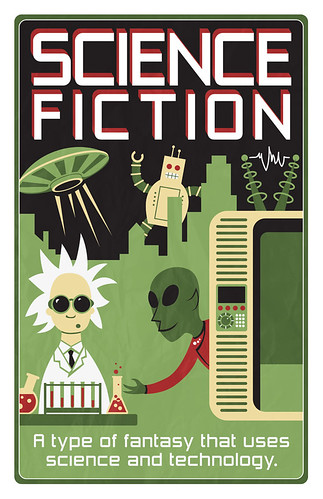
The origin of the speculative fiction genre, which today encompasses both science fiction and fantasy, is hard to pinpoint. One reason is because the term “science fiction” was introduced long after the first works we would consider to be SF were already published. Although SF existed, it hadn’t truly been defined yet. (Some would say it still isn’t.)
io9 explores the topic of the early descriptions of science fiction, mentioning “scientific romance,” “scientifiction,” “the German school of romance,” “scientific novel,” “romance of science,” and so on. I find it fascinating. It’s a wonder we settled on “science fiction” at all instead of continuing with “scientific romance.” This could very well have become the SR genre!
Even today, many people get hung up on that tag, science fiction, because many SF novels are somewhat lacking in the science department, making the difference (or lack thereof) between science fiction and fantasy difficult to discern. I imagine this is why bookstores surrendered and just started tossing SF and fantasy onto one bookshelf.
When I was a freshman in college, I was given an assignment to write about any topic I chose—but only about that topic during the 1920s in the US. Of course, I chose science fiction.
It turned out to be an incredibly challenging project for many reasons. It was hard to restrict myself to the growth of the genre over just one decade. It was also difficult to find reference materials on such an obscure topic as science fiction (which wasn’t even necessarily called that) in the 1920s. And staying away from the beginnings of the fantasy genre was also especially hard, since we can’t agree on what the difference is, even today.
Still, I tackled the assignment with fervor (especially since I considered having to take English 102 an insult to my demonstrated skills and AP scores) and produced an incredibly lengthy paper. Thankfully my professor was willing to read the whole thing, even though it was well beyond scope.
Although it’s rather dry (hello, academia) and tends to wander in focus, I’m linking to it here in its entirety. I congratulate anyone who reads the whole thing without being paid to do so. You may be interested in this quote, buried deep in the paper—Brian Aldiss, addressing the problem that a lot of SF isn’t very scientifically rigorous, said: “Science fiction is no more written for scientists than ghost stories are written for ghosts.” Brilliant!
Note: The link below is outside this server, on my day-job portfolio website. Hit the back button if you want to come back.
The Influence of the 1920s on the Birth and Development of Science Fiction
What decade do you consider to be the birth of science fiction?
Third-Party Articles
- Has 21st Century Science Fiction Gone Cowardly? Or Worse… Nostalgic? (Contrary Brin)
- Six Scientists Tell Us About The Most Accurate Science Fiction In Their Fields (io9)
- Before Science Fiction: Romances Of Science And Scientific Romances (io9)
- Four Things Science Fiction Has Promised Me That I Can’t Wait For (Kirkus Reviews)